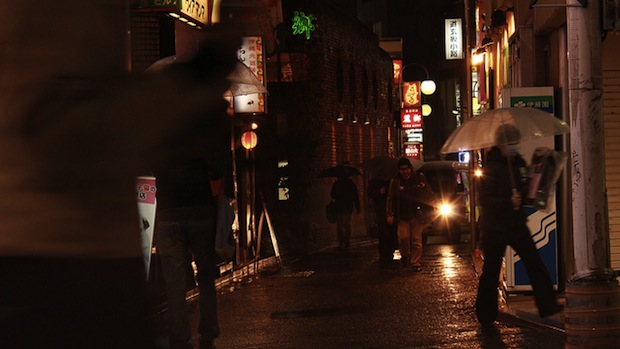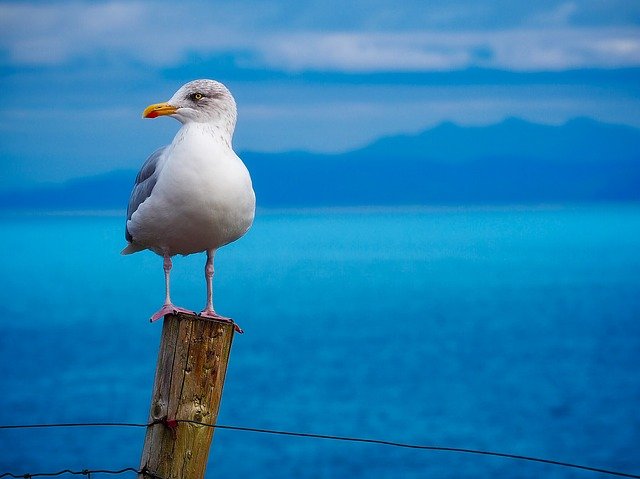You have no items in your cart. Want to get some nice things?
Go shopping
The lad who trained me up said you could tell the difference, easily, between the girls who are nasty and the girls who are nice but mucking about. The tone of their voices when they speak to you on the door, the jokes they make with each other, whether they get giggly or mean when they’ve had one too many. But now I’ve been working here a few months, and I don’t think it’s true. The girls you need to watch are the ones who think they’re nice: pretty, well-dressed girls who are used to compliments, who think that if they smile at you you’ll be flattered, won’t guess that they’re only trying to jump the queue. Catch one of them causing trouble later, try to tell them off, and they come at you spitting vodka, hair standing up from their heads at the outrage.
Sandy is a nice girl, now, a proper one, most likely because no one’s ever told her she’s nice. She’s not a punter, either, and that makes a difference: she waits tables in the Imperial Garden across the road, and she gets sick of the customers too. She comes out a couple of times a night for a fag break, and she used to stand there in the mouth of the alley by the bins, looking glum as a budgie in a cage, but a couple of months ago I called her over for a chat, and we’ve been thick as thieves ever since. Her English is not the best, but I like that: when you say something and she doesn’t understand, it’s like there’s a little space around you where you’re allowed to get things wrong, say it better the next time.
~
It’s fits and starts, this work. We’re on at nine, but nothing happens until about twenty to ten when the thrifty ones start showing up – free entry before ten, see. After ten it’s quiet again for a bit, then from ten thirty or eleven you get the ones who don’t mind paying. Half eleven is busiest, that’s when we get the proper queues, and the girls all moaning about their feet; then they look up and see you and their faces go all crafty, and they start smiling at you, trying to make small talk. It never works on me. Most people are through the doors by twelve, which suits me fine, because Sandy comes out for a break about midnight, and we have a cigarette together and talk about whatever’s been going on. When the weather’s bad I have an enormous black umbrella, and I let her come underneath – can’t do that before twelve, though, or the girls in the queue would go wild. The sight of them: shivering on their heels in the rain, water running down their bare legs, hair that they most likely spent hours on stuck like melted plastic to their scalps.
Between twelve and one it’s quiet enough, then they start leaving. Most of them are alright, just get going, but others want to hang about and talk, and that’s worse than when they want you to help them get in. I don’t know if the girls or the boys are the worst. The boys are just stumbling drunk; the girls are usually after some sympathy – they’ve had a bad night, had a fight with their friends or their bloke, they’ve heard someone talking about them in the Ladies, that sort of thing. “Sorry,” they always say, “Sorry for landing all this on you,” but then they go on talking anyway. I don’t care, exactly; nobody lands anything on me, I forget it the second it’s out of their mouths, but by that time of the night all I want is my bed, and I can’t stand hanging about for no reason.
Two o’clock we close, get rid of the last lurchers and spewers by half-past at the latest, then I’m on my way home. Getting off your feet is the best thing. A cup of tea, bit of telly if there’s anything on, then bed.
~
It was a while before I knew Sandy had a boyfriend at the Garden – sometimes I saw her coming or going with a bloke, but I was never sure if it was the same one. Turns out it was – I told you she was a nice girl.
Anyway, I asked her about him. Sam, she calls him, although I’d bet his name’s no more real than hers is. He’s from China too, but they met over here working at the restaurant. He works behind the bar. I didn’t know you could go in there just for drinks without eating, but yes, she said, because they’re open so late, and because the manager is a bit creative in his interpretation of the licensing laws, they get all sorts coming in, all night long. Mostly men the worse for wear, apparently, who sit on little stools in the bar like oversized children, making too much noise.
I tried to give Sandy some advice about Sam: I told her she should be careful, settling down young. That’s what I did, and see how that turned out. “Sam looks out for me,” she said, but personally I don’t think she’s happy.
It’s nothing she’s said, but the number of girls I have to listen to night in, night out, bitching and crying about their boyfriends and all the problems they cause them – Sandy wouldn’t whinge like that, she’s got a little dignity, but she has the same look on her face sometimes. Mostly she’s cheerful, comes tripping over to me spinning her cigarette between her fingers, pokes me in the ribs and asks me for a light; we walk a few paces up the street away from the door and light up together, and she tells me silly stories about the customers she’s got in that night, bickerings between the staff, all sorts. I’ve got a walk I can do, pretending to be a tipsy girl on high heels, and she doubles up with laughter when I do that. Other times, though, she’s quiet, leans back against the wall and looks straight across the street at the restaurant, at the battered little shrubs in their pots either side of the front door, at the name up in twitchy neon lights. “What’s up?” I ask her, when she’s like that, and she says, “Nothing, nothing, just tired,” but it’s something to do with that boy, in my opinion.
~
The thing about this job is: you work six nights a week, getting home at three o’clock in the morning, so on your night off you don’t exactly feel like turning in at ten. I’ve never been one for sitting for hours in front of the telly, so on my night off, I go out. Sometimes I go to the pictures, sometimes the pub. One night a week or so ago, I was strolling around the city centre a little after chucking-out time, and as I walked around the corner near the bus station I almost bumped straight into Sandy. She was on her own and walking fast, head down, not looking where she was going.
“Hey,” I said, “Hey!” and reached out to grab her arm. She jumped, then saw it was me, and smiled.
“Where are you off to?” I said.
“Just walking.”
“Me too, me too.” We stood there on the pavement for a couple of seconds, buses and taxis hissing past through the puddles. It was the first time I’d seen her out of work. She looked a bit lost and a bit cold as well, so I asked her if she wanted to come with me for a coffee. I said I knew a café that would still be open, only a couple of streets away, and she said, “Okay, okay.”
Inside the café the floor was slippery, a circle of muddy water by the door where someone had tried to mop up all the wet off people’s shoes, so I put my hand on her elbow to guide her to a table. We sat down at a little booth in the back and ordered two coffees. I paid. “So why aren’t you at work?” I said.
She started giggling. “Why aren’t you?”
“It’s my night off, isn’t it? I don’t work every single night. You mean to say you’ve never noticed when I’m not there?”
“No, I don’t notice!” She was laughing, her fingers were looped through the handle of her coffee cup and it jigged against the saucer; the light on the wall above her shone right down over her face and I thought: this is the best night off I’ve had in ages.
“Your night off too?” I asked her. No, she said: she was supposed to be working. She’d been at work, and had gone out for her cigarette break. She’d been standing in the alley but some men were there, bothering her, so she’d walked out onto the street and down past the club, to get a bit of space. There was a long queue by the club going down the pavement so she walked on further. Then she just kept walking.
“I feel like doing that, sometimes,” I said, trying to keep it light, although a nice, reliable girl like Sandy doesn’t just bunk off halfway through a shift. “You’ll get the sack, though, if you’re not careful,” I said, and she shrugged.
“Come on, you don’t want the sack.”
“I don’t care.”
“Come on. Did you fight with Sam?”
“No, no.”
She went quiet after that, though, and it wasn’t so fun anymore. The waitress turned the sign on the door round to Closed, and after a little while started lifting the stools up onto the table tops, knocking her mop around the table legs.
“What are you going to do now?” I asked Sandy, and she shrugged.
“You ought to go back,” I said. “I’ll walk you there. You can make it up with Sam, if that’s the trouble.”
She started tearing open the little sachets of sugar and tipping them into her empty cup, like a kid, and at that point I’d had enough. “Come on, it’s time to go,” I said, standing up. “I’ll walk you.” It was out of my way, but I walked her all the way through the centre, through the bus station and the shopping streets, past the big theatre, down past the fountain and the university buildings, all the way to where the club was. I didn’t really want to go past the club on my night off, so at the end of the street I said, “Alright, here we are.”
We looked down the street to the club, and to the Garden opposite. “Alright,” I said. “I’ll see you tomorrow.”
“See you tomorrow,” she said, and I stood and watched her until she was down the alley and in the back door.
~
The next night we had a spot of drama, and I’ve not really seen Sandy since, so I don’t know the latest. It was about twelve-thirty or so, a damp night, not too many people around, and I was already waiting to go home – my feet ache more when it’s wet and it’s slow, no distractions, just the water in the puddles gnawing in through the soles of my shoes. Sandy hadn’t come out of the restaurant yet, so I was wondering if she was in there, and hoping she hadn’t jacked it in.
Next thing, an ambulance pulled up outside the Garden, blue lights jerking like the letters on the front of the restaurant, but with only a choppy little whoop of the siren. Paramedics went in through the front door with a stretcher. A minute later a police car pulled up, and in went two officers. I walked up the pavement a bit to try and get a better view, but couldn’t see much. The paramedics came back out, carrying someone – there was no great consternation, though, nobody dead, and it looked like a bloke on the stretcher, so I wasn’t too worried. They put him into the back of the ambulance, then got going. I couldn’t stand there staring all night, but I kept an eye out and after a while saw the police leave the Garden and drive off. A few minutes later Sandy appeared at the top of the alley and I walked up the pavement, waved her over.
Like I said, Sandy’s got dignity, she’s either happy or she’s quiet, but that night she came over to me, and the moment she lit her cigarette a big splodge of rain came down off the guttering, landed on its tip with a hiss, and out went the cigarette. Now I’d either have laughed or sworn, depending on what mood I was in and how many fags I had left, but Sandy, she burst into tears. For a moment I had that horrible feeling I used to get when my wife got angry or upset with me for no reason I could see: like something falling open inside, and I didn’t know how to close it again. But I just got my cigs out of my coat and handed her the packet. She took one, but then she was just trying to smoke and cry at the same time.
So I said, “What’s up, little thing?”
“Nothing,” she said, sniffling away. “Sam’s gone to hospital.”
“Was it him in the ambulance?”
“Yep,” she said. That cigarette in her mouth went down so quick I don’t know if she was smoking it or eating it, but I gave her another.
“What happened, then?” I asked her, but she didn’t say anything. People were starting to come up the stairs of the club and out onto the street. A couple of girls in feeble dresses came clustering about me, trying to get under the umbrella, but I batted them away; they stropped off, with little yelps and shrieks.
“What’s up, Sandy? Didn’t you want to go with him to the hospital?”
Still she was just crying, so I hooked my arm around her and pulled her in under my umbrella. I gave her another cig, and we stood there for a while, me with my arm around her and her with her head bent into my chest, straightening up now and then for a sniff and a drag of the cigarette. After a while she threw her butt into the gutter and pushed at my arm until I let her go, then she walked across the road and down the alley to the Garden’s back door without saying a thing.
~
Exactly what happened, I still don’t know. Ever since that night I’ve been looking out for Sandy, watching the mouth of the alley and the shadows that move by the bins, the comings and goings.
I’ve not seen Sam at all. I’ve only seen Sandy once, and that time I didn’t catch her – I’d been inside the club, was coming back out up the steps when I saw her disappearing into the restaurant’s back door. I shouted but she didn’t hear me. I almost followed her in but I stopped myself: I didn’t want to get her in any bother, and besides, I’d have got killed myself for leaving the queue. So I’m back to just counting the girls in, waving them out, smoking on my own underneath the umbrella. I keep watching for Sandy, but the nights bloody drag now.

About Anna Lewis
Anna Lewis is the author of three poetry collections. Her latest pamphlet, A White Year, is published by Maquette. Recent short stories have appeared in New Welsh Review, The Interpreter's House, and on Litro.




